Worcestershire Archive Celebrates Black History Month 2021
- 27th October 2021
This October we have explored archives in our collections related to Black History. We hope you enjoy the varied items relating to the Colonial history of Jamaica, Kidderminster cotton spinning, possibly the first autobiography published by an African in Britain, as well as more recent celebrations of Black Heritage.
It is important to preserve and encourage awareness of our archives that evidence Britain’s colonial past and participation in the slave trade. We also seek new deposits of records to add to the archive that capture Black heritage and culture, and issues concerning people with Black heritage, who have links with the county of Worcestershire. Photos, charities, business/family papers are all very welcome to be added to our collections and they will be housed in our bespoke, secure repositories at The Hive for future generations to enjoy. For more information about depositing with us please contact us
So, here’s what we uncovered……
William Henry Lyttelton, 1st Baron, Governor of Jamaica 1762-66
The family and estate papers of the Lyttelton’s of Hagley Hall cover 16th to 20th centuries including deeds, accounts, letters, diaries, royal letters, appointments to public offices. Among the papers are letter books of the 1st Baron while serving as Governor of Jamaica. These are at Ref 705:104 BA15492.
William Henry Lyttelton, 1st Baron Lyttelton (1724 -1808) was appointed Governor of Jamaica between 1762-66. This expense account book at Ref 705:104 BA15492/134/2 covers his time in Jamaica, also London 1766-67 and Lisbon 1767-70.
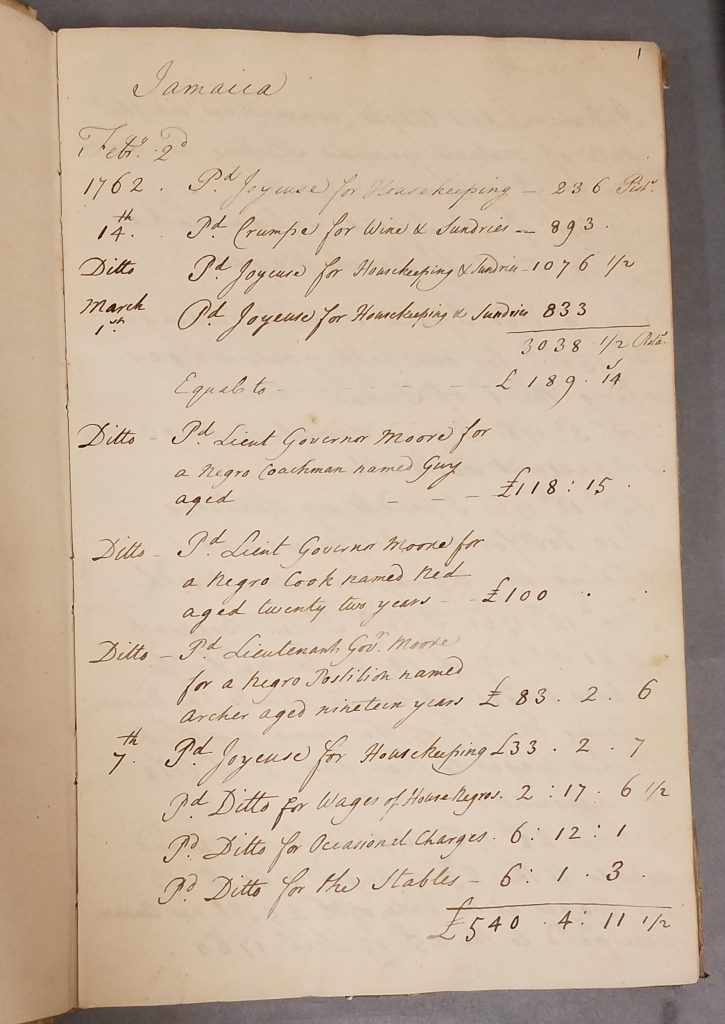
Expense account book of William Henry Lyttelton
Please note: original documents reflect attitudes and sensibilities of their time that are totally unacceptable today. As such the documents contain original text and terminology. The historical record cannot be altered but nor should it be ignored, forgotten, or buried.
There are various mentions of payments made for employment of Black people in this account book, referred to as ‘negros’.
Examples are:
March 1st 1762:
Pd [Paid] Lieut[enant] Gov Moore for a negro Coachman named Guy aged [blank] £118:16
Pd [Paid] Lieut[enant] Gov Moore for a negro cook named Ned aged twenty two years £100
Pd [Paid] Lieutenant Gov Moore for a negro position named Archer aged nineteen years £83.2.6.
……and in a page covering October 1765 to February 1765 there are six mentions of ‘negroes’:
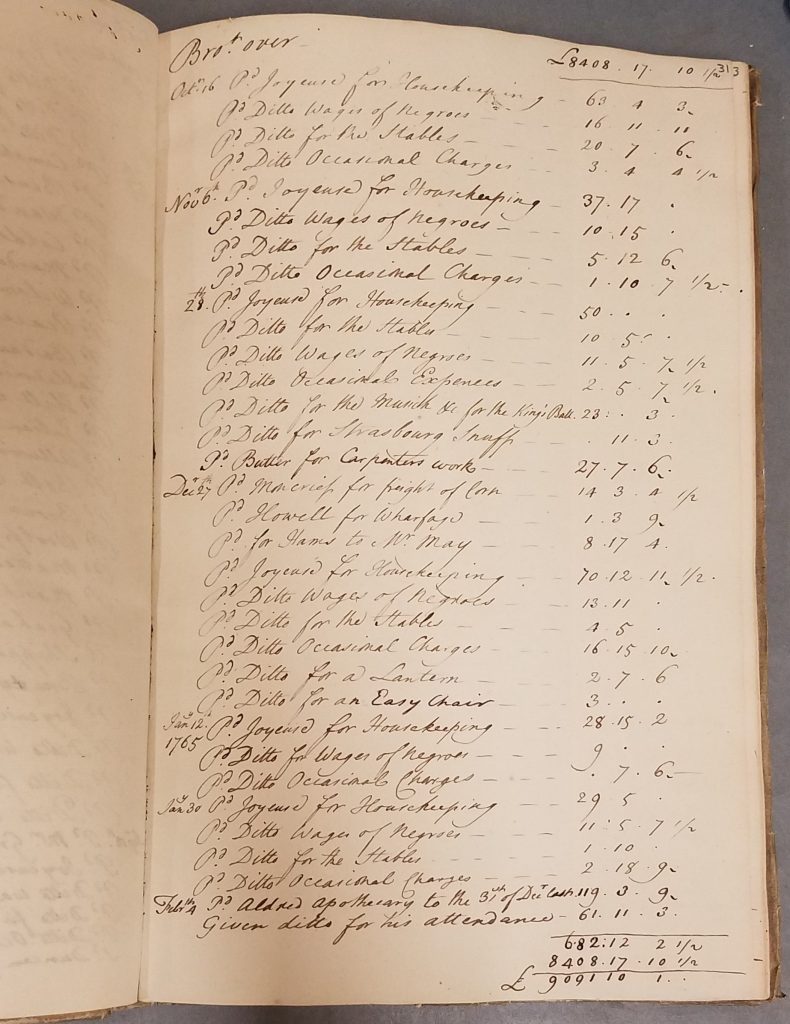
Expense account book of William Henry Lyttelton
To provide much needed insight and some context of the impact of British Colonial rule over Jamaica we sought information at Black History Month History Org of Jamaica which is an incredibly useful resource. Here are some key extracts: In May 1655, English soldiers landed near Jamaica’s Spanish Town capital. England gained formal possession of Jamaica from Spain in 1670. By 1800 the number of African slaves in Jamaica was over 300,000. Nearly 250 years later, after World War II, Jamaica began a transition to full political independence and during two decades of “constitutional decolonisation,” between 1944-1962 gained independence.
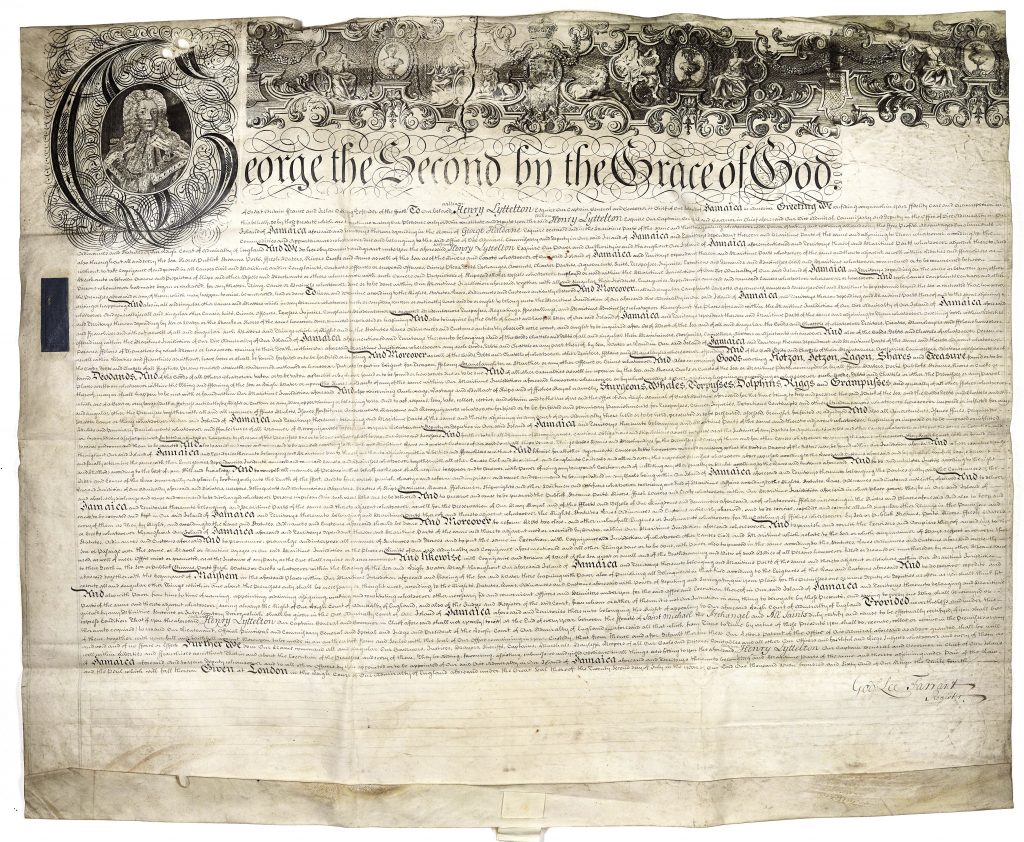
Commission from George II to William Henry Lyttelton Esq Captain General
The Lyttelton collection also contains a Commission ref 705:104 BA15492/127/1, dated 22 Jul 1760, from George III to William Henry Lyttelton Captain General and Governor in Chief of the Island of Jamaica to be Vice Admiral Commissary and Deputy in the Office of Vice Admiralty in the Island of Jamaica. The head of the document is decorated with engravings and the initial letter G contains an engraved portrait of the King.
William Henry Lyttelton, the youngest son of Sir Thomas Lyttelton, 4th Baronet, held various government appointments such as MP for Bewdley 1748-55 and 1774-1790, and Governor of South Carolina, America 1755-1760 for which hold some papers.
Kidderminster: Cotton Spinning & the Royal African Company
On the thirtieth day of June 1870 the Kidderminster Cotton Spinning Company at Slingfield Mill was liquidated by a group of local gentlemen. This indenture includes a lovely map of the property which is unusual. The company had been established by Thomas Lea 1841-1902 who was a Liberal Politician and had built Slingfield Mill in 1864 to spin cotton.
This mill was established after the abolition of British slave trade in 1807 but it is possible the cotton still came from the Americas and was picked by African Americans there, who by this time were either slaves, freed slaves or indentured ex-slaves, since abolition in the Americas occured in the late 1800s.
Kidderminster had been trading with the Royal African Company from as early as the 1680s, setting up the triangular trade which took finished goods from Britain to the Africans coast in return for slaves, who were sold in America to work on plantations, picking cotton which was delivered to Britain for processing.
According to an account in the National Archives, sixty-four local clothiers (in Kidderminster) certified that it had been “the p[ar]ticular directions of the Royall Affrican Compa[ny]” that had induced them to undertake “ye New Manufactories of Boysadoes & striped Carpetts.”
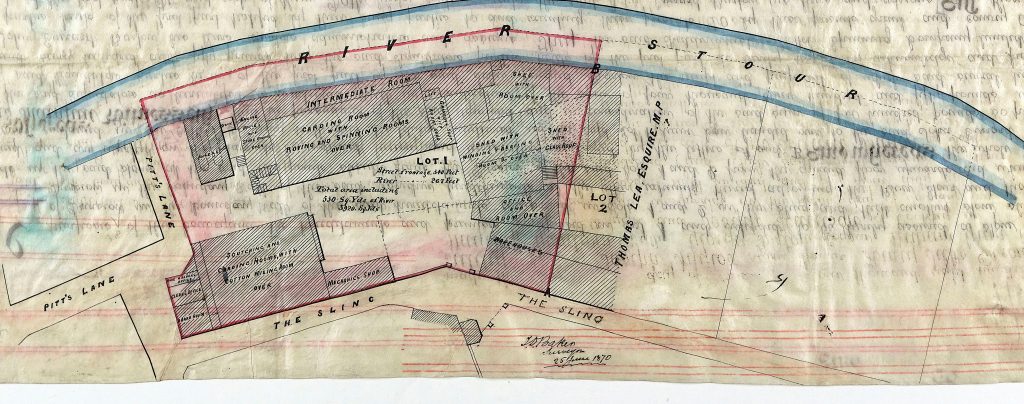
Thomas Lea deed ref 010:17 BA5288
Ukawsaw Gronniosaw, in Kidderminster c.1771
Gronniosaw (1710-1773) worked in the 1760s as a weaver in Norfolk under the name of James Albert, before coming to Kidderminster. He was born in the city of Baurnou, in Nigeria, grandchild to the reigning King there. Sold into slavery, Gronniosaw was granted his freedom in 1748 and entered the British Navy before he married a white weaver. In Kidderminster his children were baptised by Fawcett in 1771 and Fawcett found work for Gronniosaw and his wife in Kidderminster, at a carpet factory.
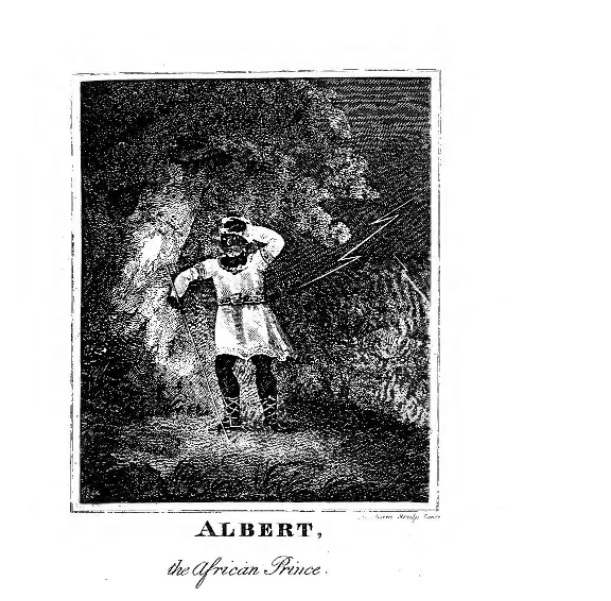
Illustration of Ukawsaw Gronniosaw. This image has been used curtesy of Wikimedia Commons.
This sermon, below, is by Benjamin Fawcett, a Calvinist minister who preached at the Old Independent Meeting House in Kidderminster. His sermons inspired Gronniosaw, an ex-slave, to move to Kidderminster. Bewdley and Kidderminster libraries hold copies of his autobiography A narrative of the most remarkable particulars in the life of James Albert Ukawsaw Gronniosaw, considered the first published by an African in Britain, at shelf LB/GRONNIOSAW,J.
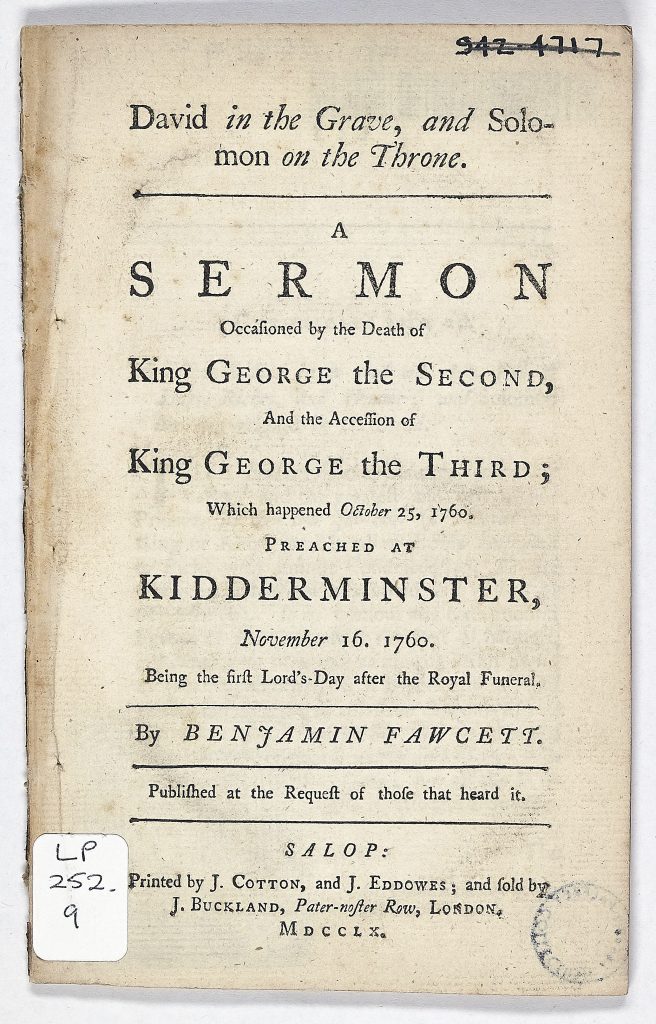
Sermon by Benjamin Fawcett, Palfrey 252.9
Redditch Black History Society
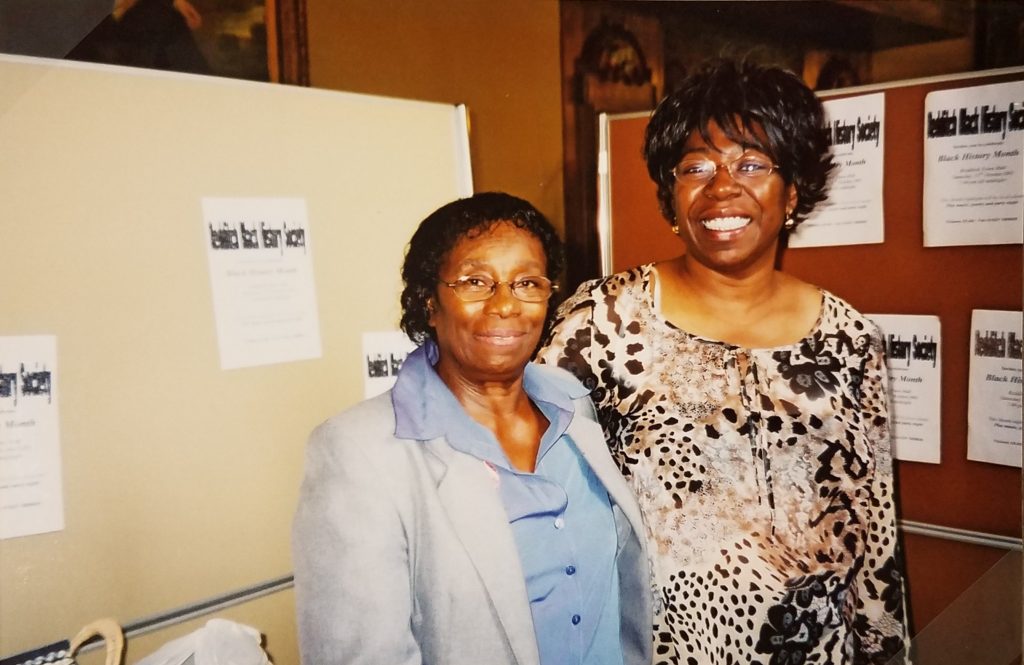
Members of Redditch Black History Society. 20th September 2004 ref WPS 72663
In previous years our team had such fun experiences, working and celebrating with Redditch Black History Society so this photo brings back great memories! It was taken at the Worcester Guildhall at a Local History Fair.
We have enjoyed locating and researching items in the archive and there is often so much more research that can be done around the context of records in history to bring them to life! Would you like to volunteer to help us research and promote items in our collections? Contact us via our website.
You can also have a look at lst year’s Black History Month Online Exhibition.
Post a Comment